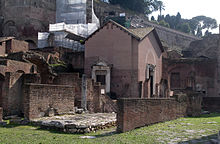Santa Maria Antiqua
Itsura
| Santa Maria Antiqua al Foro Romano Sinaunang Simbahan ng Santa Maria sa Romanong Forum | |
|---|---|
 Oratoryo ng Apatnapung Martir, sa may pasukan ng Santa Maria Antiqua sa Romanong Forum | |
| Relihiyon | |
| Pagkakaugnay | Katoliko Romano |
| Katayuang eklesyastikal o pang-organisasyon | Hindi aktibo |
| Taong pinabanal | 5th century |
| Lokasyon | |
| Lokasyon | Roma, Italya |
| Mga koordinadong heograpikal | 41°53′27.6″N 12°29′8.1″E / 41.891000°N 12.485583°E |
| Arkitektura | |
| Uri | Simbahan |
| Istilo | arkitekturang Bisantino |
| Groundbreaking | ika-5 siglo |
| Mga detalye | |
| Haba | 30 metro (98 tal) |
| Lapad | 20 metro (66 tal) |
Ang Santa Maria Antiqua (Sinaunang Simbahan ng Santa Maria) ay isang Marianong simbahang Katoliko Romano sa Roma, Italya, na itinayo noong ika-5 siglo sa Romanong Forum, at sa mahabang panahon ang monumental na daan papuntang mga imperyal na palasyo ng Palatino.
Matatagpuan sa paanan ng Burol Palatino, ang Santa Maria Antiqua ay ang pinakalumang monumentong Kristiyano sa Romanong Forum. Ang simbahan ay naglalaman ng pinakaunang nadiskubreng Romanong dibuho ni Santa Maria Regina, ang Birheng Maria bilang isang Reyna, mula ika-6 na siglo.[1][2][3]
Mga sanggunian
[baguhin | baguhin ang wikitext]- Horace, K. (1913). . Sa Herbermann, Charles (pat.). Catholic Encyclopedia (sa wikang Ingles). New York: Robert Appleton Company.
{{cite ensiklopedya}}:|access-date=requires|url=(tulong)CS1 maint: date auto-translated (link) - Benigni, U. (1913). . Sa Herbermann, Charles (pat.). Catholic Encyclopedia (sa wikang Ingles). New York: Robert Appleton Company.
{{cite ensiklopedya}}:|access-date=requires|url=(tulong)CS1 maint: date auto-translated (link) - David, Joseph (1911). Sainte Marie-Antique; étude liturgique et hagiographique avec un plan de l'église (in French). Rome: M. Bretschneider.
- Webb, Matilda (2001). "Santa Maria Antiqua". The Churches and Catacombs of Early Christian Rome. Brighton: Sussex Academic Press. pp. 112–122. ISBN 1-902210-58-1.
- Santa Maria Antiqua Project. "Santa Maria Antiqua: history from antiquity until the year 847 A.D." Soprintendenza Archeologica di Roma. Archived from the original on 2007-08-11. Retrieved 2009-06-13.
- Romanelli, Pietro; Nordhagen, Per Jonas (1999). S. Maria Antiqua (in Italian) (2 ed.). Roma: Ist. poligrafico dello Stato, Libreria dello Stato. ISBN 88-240-3719-4.
- Angiolino, Loredana (2004). "Santa Maria Antiqua: Chiesa Bizantina a Roma". Bollettino Telematico Dell'Arte (in Italian) (363). ISSN 1127-4883.
- Claridge, Amanda (1998). Rome: An Oxford Archaeological Guide. Oxford: Oxford University Press. ISBN 0-19-288003-9.
- Avery, Myrtilla (1925). "The Alexandrian Style at Santa Maria Antiqua, Rome". The Art Bulletin. 7 (4): 131–149. doi:10.2307/3046494. JSTOR 3046494.
- Folgero, Olav (2009). "The Lowest, Lost Zone in the Adoration of the Crucified Scene in Santa Maria Antiqua in Rome: A New Conjecture". Journal of the Warburg and Courtauld Institutes. 72: 207–219.
- Frothingham Jr, A.L. (1895). "Notes on Byzantin Art and Culture in Italy and Especially in Rome". The American Journal of Archaeology and of the History of the Fine Arts. 10 (2): 152–208. doi:10.2307/496574. JSTOR 496574.
- Knipp, David (2002). "The Chapel of Physicians at Santa Maria Antiqua". Dumbarton Oaks Papers. 56: 1–23. doi:10.2307/1291851. ISSN 0070-7546. JSTOR 1291851.
- Maguire, Henry (1989). "Style and Ideology in Byzantine Imperial Art". Gesta. 28 (2): 217–231. doi:10.2307/767070. JSTOR 767070.
- Nordhagen, Per Jonas (1967). "John VII's Adoration of the Cross in S. Maria Antiqua". Journal of the Warburg and Courtauld Institutes. 3: 388–390. doi:10.2307/750753. JSTOR 750753.
- Nordhagen, Per Jonas (1968). The Frescoes of John VII (A.D. 705-707) In S. Maria Antiqua in Rome. Rome.
- Nordhagen, Per Jonas (1990). Studies in Byzantine and Early Medieval Painting. London: Pindar Press. ISBN 978-0-907132-47-9.
- Osborne, John (1987). "The Atrium of S. Maria Antiqua, Rome: A History in Art". Papers of the British School at Rome. 55: 186–223. doi:10.1017/s0068246200009004.
Karagdagang pagbabasa
[baguhin | baguhin ang wikitext]- Lucey, Stephen J. (2007). "Art and Socia-Cultural Identity in Early Medieval Rome - The Patrons of Santa Maria Antiqua". In O'carragain, Eamonn; Neuman de Vegvar, Carol L. (eds.). Roma Felix: formation and reflections of medieval Rome. Aldershot: Ashgate Publishing Ltd. pp. 139–158. ISBN 978-0-7546-6096-5.
- Osborne, J.; Brandt, G.; Morganti, eds. (2005). Santa Maria Antiqua al Foro Romano cento anni dopo. Campisano Editore. ISBN 88-88168-21-4.
- ↑ Erik Thunø, 2003 Image and relic: mediating the sacred in early medieval Rome ISBN 88-8265-217-3 page 34
- ↑ Bissera V. Pentcheva, 2006 Icons and power: the Mother of God in Byzantium ISBN 0-271-02551-4 page 21
- ↑ Anne J. Duggan, 2008 Queens and queenship in medieval Europe ISBN 0-85115-881-1 page 175
